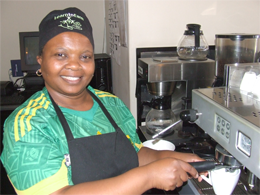by Jackie Rothmeier
On Thursday October 8th, 2015, Northeastern University’s Social Enterprise Institute hosted Reverend Roche Van Wyk, Director of Learn to Earn, to speak on his knowledge and experience in the social enterprise space as a part of the SEI monthly lecture series.
Learn to Earn is a skills development and job creation non-profit organization that was established in 1989 and is currently based in a township called Khayalitsha in Cape Town, South Africa. At the time of its formation, Rev. Van Wyk explained that Learn to Earn was “little more than a few sewing machines,” with limited resources and a sense of potential. However, that time in South Africa’s history is characterized as an era of great political tension and transition, when the oppressive apartheid regime moved to a democratic state under the leadership of Nelson Mandela. This long –awaited transition left many South Africans jobless with a weakened economy struggling to get back on its feet. Having a background in engineering, theology, community action, and intercultural studies, Rev. Van Wyk described the pain, frustration, and unemployment he witnessed running rampant in his home country and decided to take action in the form of Learn to Earn.
He explained that the organization is based on a foundation of four developmental pillars as they aim to empower their students economically, socially, emotionally and spiritually. These pillars epitomize the holistic development structure that LtE staff has recognized as the most effective and lasting way to address widespread unemployment.
 The foundational theory of Learn to Earn is based around the idea that skills development creates a culture of ownership and responsibility, where each student has autonomy and independence over their training. This is best seen in their slogan “A Hand Up, not a Hand Out”, where their classes and services are not subsidized or offered for free. Rev. Van Wyk explained that while the main goal for LtE is to eradicate unemployment and other legacies of injustice throughout the whole continent of Africa, he would love to see the day where his work is no longer necessary for the empowerment and survival of his community. He described this theory as a social enterprise “litmus test” that proves the dedication of an enterprise to its mission – whether it is willing to be closed down or if it scales to survive.
The foundational theory of Learn to Earn is based around the idea that skills development creates a culture of ownership and responsibility, where each student has autonomy and independence over their training. This is best seen in their slogan “A Hand Up, not a Hand Out”, where their classes and services are not subsidized or offered for free. Rev. Van Wyk explained that while the main goal for LtE is to eradicate unemployment and other legacies of injustice throughout the whole continent of Africa, he would love to see the day where his work is no longer necessary for the empowerment and survival of his community. He described this theory as a social enterprise “litmus test” that proves the dedication of an enterprise to its mission – whether it is willing to be closed down or if it scales to survive.
Throughout his talk, many memories and personal anecdotes were added to the faces that were projected in the videos and slides that showed LtE’s students. His love and passion for his work shone through every moment of his lecture, but none more so than when he spoke about GroundUp, which is the newest initiative that Learn to Earn has created where students can be trained to become professional baristas. Rev. Van Wyk explained the lengthy and strenuous trainings and tests that the participants undergo in order to become certified, which has proven to have successful job-market placement already. He discussed the successes and stresses of the program thus far in terms of resources and graduation rates, which have been low but not discouraging. He also alluded to the fact that some talk of implementing contracts with local restaurants and cafes has begun as the brand gains attention.
Rev. Van Wyk’s main point about his experience was made very clear: the South African people do not need aid or entitlement, but instead they need development and imagination. The opportunities that Learn to Earn and other enterprises create for the undereducated and marginalized populations in Cape Town have drastically reshaped the lives and trajectories for many South African families. As he honorably quoted James Gregory Lord at the beginning of the evening, “…apart from the ballot box, philanthropy represents a way to choose where society may progress.” South Africa’s future rests in hands of the future generations, and centers like Learn to Earn have created a foundation for further development and improvement in the lives of local Khayalitsha families as well as families throughout Cape Town.
“We need to stop thinking of poverty as just a lack of wealth, and start thinking of poverty as a plural. We need to talk about poverties.” – Rev. Roche Van



